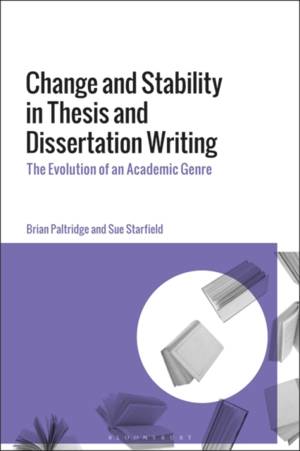
Bedankt voor het vertrouwen het afgelopen jaar! Om jou te bedanken bieden we GRATIS verzending (in België) aan op alles gedurende de hele maand januari.
- Afhalen na 1 uur in een winkel met voorraad
- In januari gratis thuislevering in België
- Ruim aanbod met 7 miljoen producten
Bedankt voor het vertrouwen het afgelopen jaar! Om jou te bedanken bieden we GRATIS verzending (in België) aan op alles gedurende de hele maand januari.
- Afhalen na 1 uur in een winkel met voorraad
- In januari gratis thuislevering in België
- Ruim aanbod met 7 miljoen producten
Zoeken
Change and Stability in Thesis and Dissertation Writing
The Evolution of an Academic Genre
Brian Paltridge, Sue Starfield
Hardcover | Engels
€ 220,45
+ 440 punten
Omschrijving
Examining recent changes in the once stable genre of doctoral thesis and dissertation writing, this book explores how these changes impact on the nature of the doctoral thesis/dissertation itself.Covering different theories of genre, Brian Paltridge and Sue Starfield focus on the concepts of evolution, innovation and emergence in the context of the production and reception of doctoral theses and dissertations.
Specifically concerned with this genre in the humanities, social sciences and visual and performing arts, this book also investigates the forces which are shaping changes in this high-stakes genre, as well as those which act as constraints. Employing textography as its methodological approach, the book provides multiple perspectives on the ways in which doctoral theses and dissertations are subject to forces of continuity and change in the academy. Analyses of the 'new humanities' doctorate, professional doctorates, practice-based doctorates, and the doctorate by publication contribute to understandings of new variants of the doctoral dissertation genre. The book paves the way for a new generation of doctoral students and asks, 'what might the doctorate of the future look like?'.
Specifically concerned with this genre in the humanities, social sciences and visual and performing arts, this book also investigates the forces which are shaping changes in this high-stakes genre, as well as those which act as constraints. Employing textography as its methodological approach, the book provides multiple perspectives on the ways in which doctoral theses and dissertations are subject to forces of continuity and change in the academy. Analyses of the 'new humanities' doctorate, professional doctorates, practice-based doctorates, and the doctorate by publication contribute to understandings of new variants of the doctoral dissertation genre. The book paves the way for a new generation of doctoral students and asks, 'what might the doctorate of the future look like?'.
Specificaties
Betrokkenen
- Auteur(s):
- Uitgeverij:
Inhoud
- Aantal bladzijden:
- 296
- Taal:
- Engels
Eigenschappen
- Productcode (EAN):
- 9781350146570
- Verschijningsdatum:
- 11/01/2024
- Uitvoering:
- Hardcover
- Formaat:
- Genaaid
- Afmetingen:
- 156 mm x 234 mm
- Gewicht:
- 594 g

Alleen bij Standaard Boekhandel
+ 440 punten op je klantenkaart van Standaard Boekhandel
Beoordelingen
We publiceren alleen reviews die voldoen aan de voorwaarden voor reviews. Bekijk onze voorwaarden voor reviews.









